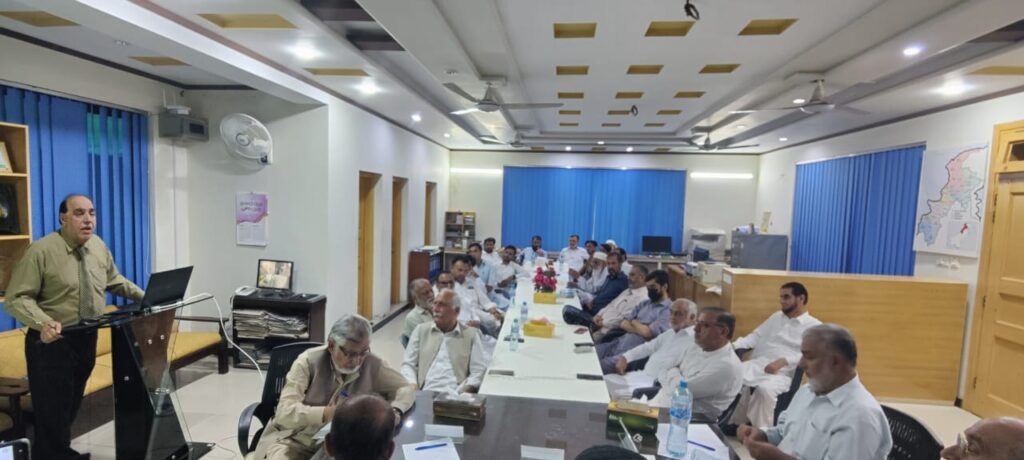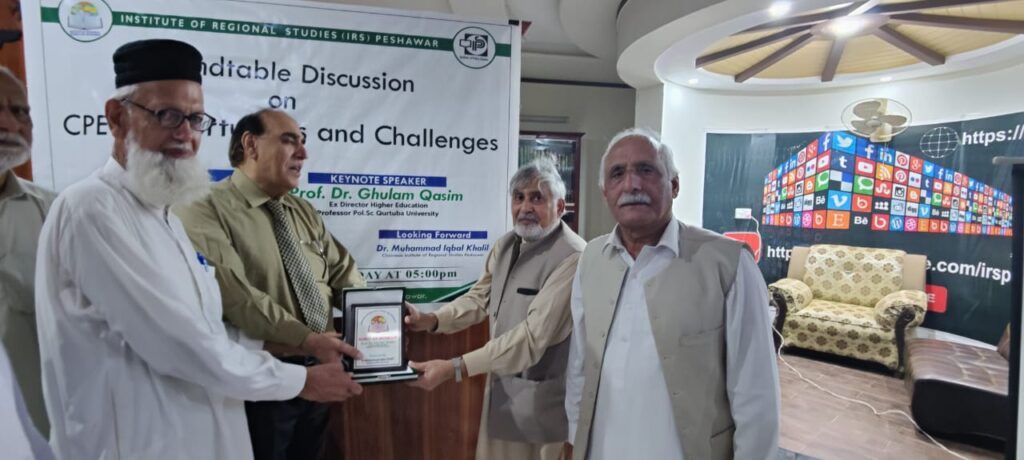The experts highlighted that while CPEC is a beacon of hope for Pakistan’s economic future, it is being targeted by terrorists operating seven active corridors with the aim of derailing the project

By Sudhir Ahmad Afridi
KHYBER: The China-Pakistan Economic Corridor (CPEC) stands as a monumental project aimed at fostering construction and development in Pakistan. However, according to experts at a recent roundtable discussion titled “CPEC: Opportunities and Challenges,” forces hostile to Pakistan are aggressively working to undermine this crucial initiative. The event, organized by the Institute of Regional Studies (IRS), Peshawar, in collaboration with the Institute of Policy Studies (IPS), Islamabad, underscored the significance of CPEC and the pressing need to safeguard it from sabotage.
The discussion was chaired by Professor Dr. Zahid Anwar, a former Pro-Vice Chancellor, Dean of Social Sciences, and Director of the China Study Center at Peshawar University. Distinguished participants included Professor Dr. Adnan Sarwar, former Dean and Chairman of the International Relations Department at Peshawar University; Professor Dr. Ghulam Qasim Marwat, Chairman of the Pakistan Study Department at Qurtuba University; Dr. Muhammad Iqbal Khalil, Chairman of IRS; Engineer Azizul Haq; and Professor Dr. Fazal Rahman Qureshi.
The experts highlighted that while CPEC is a beacon of hope for Pakistan’s economic future, it is being targeted by terrorists operating seven active corridors with the aim of derailing the project. The speakers emphasized that in an era where economic development is paramount, regional cooperation is critical. They pointed to successful models such as the European Union, ASEAN, and the Shanghai Cooperation Organization (SCO) as blueprints for the success of CPEC and the broader Belt and Road Initiative (BRI).

China’s unwavering support for Pakistan, particularly through its investments in CPEC, was a focal point of the discussion. The speakers lauded China as a time-tested ally, contrasting its consistent support with the United States, which they accused of betraying Pakistan on several occasions, including through the imposition of economic sanctions. The participants urged the nation to unite against the conspiracies aimed at disrupting CPEC. They stressed the importance of understanding the malicious intentions behind these plots and called for setting aside internal differences to protect this vital project.
The roundtable also highlighted the strong educational ties between Pakistan and China, with over 20,000 Pakistani students currently pursuing higher education in China. This, the speakers noted, is a testament to the enduring friendship between the two nations. They encouraged the acknowledgment and bridging of cultural and social differences as Pakistan continues to engage with China. A notable recommendation was the opening of natural east-west trade corridors, in addition to the existing north-south CPEC route, to enhance trade opportunities.
The experts advocated for a shift in focus from security and geopolitics to economic and trade objectives that serve mutual interests. The discussion concluded with a Q&A session, where the speakers addressed questions from the participants, reinforcing the critical importance of CPEC and the need for collective efforts to ensure its success amidst the challenges posed by adversarial forces.
CPEC, #EconomicDevelopment, #ChinaPakistanRelations, #BeltAndRoadInitiative, #PakistanChinaFriendship, #RegionalCooperation, #BRI, #EconomicCorridors, #CPECChallenges, #Peshawar, #InternationalRelations, #PakistanDevelopment, #SecurityAndTrade, #EducationalTies, #ChinaSupport, #USPakistanRelations, #Geopolitics, #EconomicGrowth,



